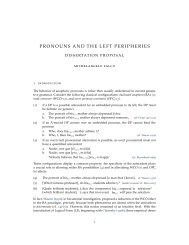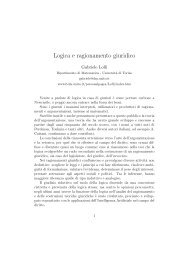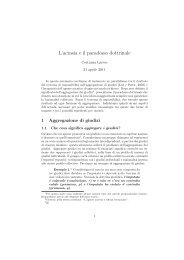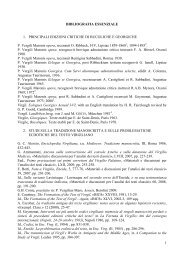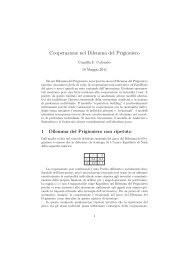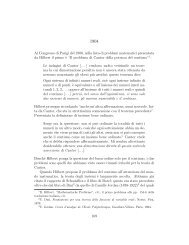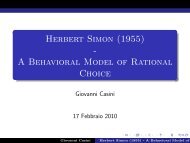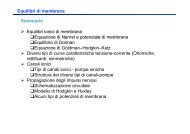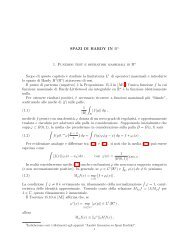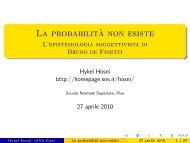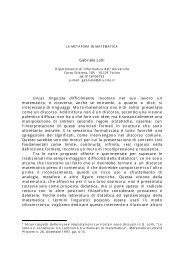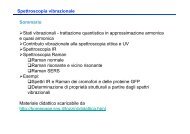Scavalcamento Debole e Catene in Forma Logica - Pagine ...
Scavalcamento Debole e Catene in Forma Logica - Pagine ...
Scavalcamento Debole e Catene in Forma Logica - Pagine ...
You also want an ePaper? Increase the reach of your titles
YUMPU automatically turns print PDFs into web optimized ePapers that Google loves.
1 – <strong>Scavalcamento</strong> <strong>Debole</strong>: Fenomeni e Analisi<br />
(6) Se un NP serve da antecedente per un pronome def<strong>in</strong>ito alla sua s<strong>in</strong>istra il<br />
pronome deve essere più profondamente <strong>in</strong>cassato dell’NP.<br />
Postal (1970) (che attribuisce l’osservazione orig<strong>in</strong>ale a Kuroda) ha notato che se<br />
un pronome def<strong>in</strong>ito è alla s<strong>in</strong>istra di un NP, questo può funzionare da antecedente<br />
del pronome solo se è def<strong>in</strong>ito:<br />
(7) a. ?* The fact that hei lost amused someonei <strong>in</strong> the crowd.<br />
b. * The man who lost iti need to f<strong>in</strong>d someth<strong>in</strong>gi.<br />
c. ?* Hisi realization that the world was explod<strong>in</strong>g alarmed someonei.<br />
(Postal, 1970)<br />
Postal nota delle eccezioni alla sua generalizzazione. Infatti gli <strong>in</strong>def<strong>in</strong>iti generici<br />
si comportano come i def<strong>in</strong>iti:<br />
(8) a. If hei has an ugly wife, a mani should f<strong>in</strong>d a mistress.<br />
b. When theyi are angry, gorrillasi can be awful mean.<br />
c. The fact that hei is be<strong>in</strong>g sued should worry [any bus<strong>in</strong>essman]i.<br />
d. The girl who hei is go<strong>in</strong>g to marry can upset [any bridegroom to be]i.<br />
(Postal, 1970)<br />
Inf<strong>in</strong>e Wasow (1972) nota un’altra famiglia eccezioni alla generalizzazione sulla<br />
BP. Anche gli <strong>in</strong>def<strong>in</strong>iti specifici sono da associare agli NP def<strong>in</strong>iti ai f<strong>in</strong>i della<br />
relazioni di BP:<br />
(9) a. After Bill kissed heri [a certa<strong>in</strong> young lady]i blushed repeatedly.<br />
b. That hei was not elected upset [a certa<strong>in</strong> lead<strong>in</strong>g politician]i.<br />
c. The woman hei loved betrayed [a man I know]i.<br />
Dunque gli <strong>in</strong>def<strong>in</strong>iti specifici e generici possono funzionare da antecedenti per la<br />
BP se rispettano la condizione <strong>in</strong> (6), mentre gli <strong>in</strong>def<strong>in</strong>iti non specifici e non generici<br />
non possono funzionare da antecedente nonostante rispett<strong>in</strong>o la condizione. 5<br />
5 Lakoff (1968) nota un’ulteriore classe di eccezioni. I pronomi soggetto si comportano <strong>in</strong> maniera<br />
diversa dagli altri elementi nella BP:<br />
(1) i. In Maryi’s apartment, a thief assaulted heri.<br />
ii. * In Maryi’s apartment, shei was assaulted by a thief.<br />
iii. It was Johni’s dog that hit himi.<br />
iv. * It was Johni’s dog that hei hit.<br />
Queste costruzioni non rispettano la condizione sulla BP <strong>in</strong> quanto il pronome non è più profondamente<br />
<strong>in</strong>cassato dell’antecedente, tuttavia si produce un risultato agrammaticale solo nel caso il<br />
pronome funzioni da soggetto.<br />
8



